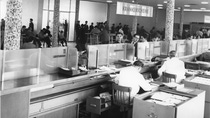Who we are
Doctors, Education and Community Service
Assuming social responsibility means something completely different for BASF today than in the first decades of its existence. Nevertheless, then and now it succeeds in finding solutions for the social challenges of the time.
BASF’s social responsibility is initially confined to its employees. To counter the health hazards of working with chemicals in the 19th century, it already employs a physician at the plant in 1866 – the first factory physician in the history of chemical industry. Another pioneering achievement is the construction of the first European company-owned sanatorium for lung disease in the Palatine Dannenfels in 1892. In addition to promoting good health, it becomes committed early on to providing insurance for its employees through illness and old age. For this, it establishes pension (1871) and health insurance (1875) programs before insurance coverage becomes a legal requirement in Germany. Other benefits such as paid vacation (1908) and operational co-determination result from labor disputes. In the picture on the right: The “father” of social policy at BASF, Heinrich Brunck (1847–1911).
After improving working conditions and general living conditions for its employees, BASF expands its social commitment beyond its factory gates. It begins by hosting cultural events which, since the first symphony concert in 1921, have been organized not only for employees, but also for other culture enthusiasts. Today it supports children and young people around the world with educational projects. School laboratories are one example. The first one is set up in 1997 in Ludwigshafen. BASF now maintains school laboratories at locations in more than 30 countries.







